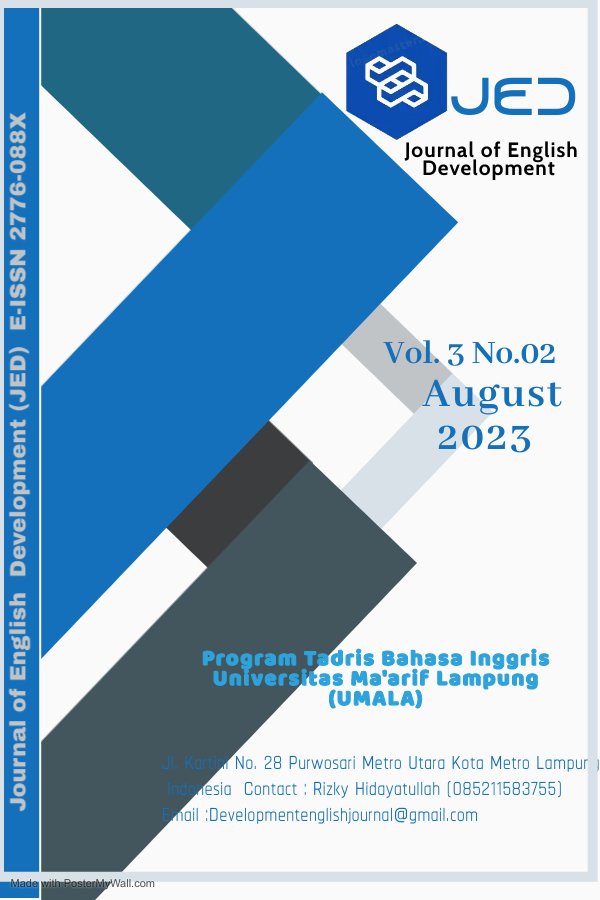Impact of Weblog to Increase English Essay Writing Ability
English
DOI:
https://doi.org/10.25217/jed.v3i02.3770Keywords:
Keywords: English, Essay, Writing, WeblogAbstract
Abstract
The purpose of this research is to get the impact of weblogs on English essay writing skills. This study used a quasi-experimental study with a one-group pre-test and post-test experimental design. The sample in this study were students of the English Program at BSI University, Jakarta. 50 students participated in the research process. The treatment process was carried out in 14 meetings and before treatment students were given a pre-test and after treatment, students received a post-test. Data was collected using documentation taken from the results of students' English essay writing tests. The data analysis technique uses a two-sample paired t-test for the mean. The results of the study concluded that the results of the t-test showed t-Stat < t-table (-32.4678 < 2.0095), meaning that weblogs have a good level of effectiveness in improving the ability to write English essays. Students understand the steps for developing essay writing well. The results of this study have implications for understanding the concept of using multimedia technology for students to write English essays which can lead to easy access anywhere and anytime.
References
Brown, D. (2007). Principles of Language Learning and Teaching. Pearson Education.
Cheng, G., & Chau, J. (2011). A Comparative Study of Using Blogs and Wikis for Collaborative Knowledge Construction. International Journal of Instructional Media, 38(1), 71. https://www.questia.com/read/1G1-273786679/a-comparative-study-of-using-blogs-and-wikis-for-collaborative
Cho, Y., & Choi, I. (2018). Writing from sources: Does audience matter? Assessing Writing, 37, 25–38. https://doi.org/10.1016/J.ASW.2018.03.004
Creswell, J. W., & Creswell, J. D. (2018). Research design: Qualitative, quantitative, and mixed methods approaches fifth edition. SAGE Publications Inc.
Di Gregorio, L., & Beaton, F. (2019). Blogs in the modern foreign languages curriculum. A case study on the use of blogging as a pedagogic tool and a mode of assessment for modern foreign languages students. Higher Education Pedagogies, 4(1), 406–421. https://doi.org/10.1080/23752696.2019.1644660
Giarré, L., & Jaccheri, L. (2008). Blogging as a research and educational tool: a three years experience. IFAC Proceedings Volumes, 41(2), 14630–14635. https://doi.org/10.3182/20080706-5-kr-1001.02478
Halic, O., Lee, D., Paulus, T., & Spence, M. (2010). To blog or not to blog: Student perceptions of blog effectiveness for learning in a college-level course. The Internet and Higher Education, 13(4), 206–213. https://doi.org/10.1016/J.IHEDUC.2010.04.001
Mondada, L., & Svinhufvud, K. (2016). Writing-in-interaction. Language and Dialogue, 6(1), 1–53. https://doi.org/10.1075/LD.6.1.01MON
Montero-Fleta, B., & Pérez-Sabater, C. (2010). A research on blogging as a platform to enhance language skills. Procedia - Social and Behavioral Sciences, 2(2), 773–777. https://doi.org/10.1016/j.sbspro.2010.03.100
Noel, L. (2015). Using Blogs to Create a Constructivist Learning Environment. Procedia - Social and Behavioral Sciences, 174, 617–621. https://doi.org/10.1016/J.SBSPRO.2015.01.591
Rahman Sidek, E. A., & Md.Yunus, M. (2012). Students’ Experiences on using Blog as Learning Journals. Procedia - Social and Behavioral Sciences, 67, 135–143. https://doi.org/10.1016/j.sbspro.2012.11.314
Skains, R. L. (2017). The Adaptive Process of Multimodal Composition: How Developing Tacit Knowledge of Digital Tools Affects Creative Writing. Computers and Composition, 43, 106–117. https://doi.org/10.1016/J.COMPCOM.2016.11.009
Spanou, S., & Zafiri, M.-N. (2019). Teaching Reading and Writing Skills to Young Learners in English as a Foreign Language Using Blogs: A Case Study. Journal of Language and Cultural Education, 7(2), 1–20. https://doi.org/10.2478/jolace-2019-0009
Sriwimon, L., & Zilli, P. J. (2017). Applying Critical Discourse Analysis as a conceptual framework for investigating gender stereotypes in political media discourse. Kasetsart Journal of Social Sciences, 38(2), 136–142. https://doi.org/10.1016/j.kjss.2016.04.004
Syarofi, A., Kuswahono, D., & Rizky, H. (2018). Implementing Process Writing Strategy Using Weblogs to Improve Students’ Ability in Writing Descriptive Text. Lingua Cultura, 12(4), 351. https://doi.org/10.21512/lc.v12i4.4142
Thulasi, S., Ismail, F. B., & Salam, A. R. Bin. (2015). Role of model essays in developing students writing skills in Malaysian Schools: A review of literature. Mediterranean Journal of Social Sciences, 6(2S1), 56–61. https://doi.org/10.5901/MJSS.2015.V6N2S1P56
Top, E. (2012). Blogging as a social medium in undergraduate courses: Sense of community best predictor of perceived learning. The Internet and Higher Education, 15(1), 24–28.
Vetter, M. A., McDowell, Z. J., & Stewart, M. (2019). From Opportunities to Outcomes: The Wikipedia-Based Writing Assignment. Computers and Composition, 52, 53–64. https://doi.org/10.1016/J.COMPCOM.2019.01.008
Williams, C., & Beam, S. (2019). Technology and writing: Review of research. Computers and Education, 128, 227–242. https://doi.org/10.1016/J.COMPEDU.2018.09.024
Ying, K. K., Cheung, M., Leung, K., Kwan, R., Lee, R., & Wong, K. (2013). Learning through Blogging: Understanding Teacher and Student Perceptions towards English Writing Blogs. Communications in Computer and Information Science, 407 CCIS, 200–211. https://doi.org/10.1007/978-3-642-45272-7_19
Yundayani, A., Emzir, E., & Rafli, Z. (2017). NEED ANALYSIS: THE WRITING SKILL INSTRUCTIONAL MATERIAL CONTEXT FOR ACADEMIC PURPOSES. English Review: Journal of English Education, 6(1), 59. https://doi.org/10.25134/erjee.v6i1.771
Zandi, P., Thang, S. M., & Krish, P. (2014). Teacher Professional Development through Blogging: Some Preliminary Findings. Procedia - Social and Behavioral Sciences, 118, 530–536. https://doi.org/10.1016/j.sbspro.2014.02.072

Downloads
Published
How to Cite
Issue
Section
License
Copyright (c) 2023 Euis Meinawati, Sri Arfani

This work is licensed under a Creative Commons Attribution-ShareAlike 4.0 International License.





